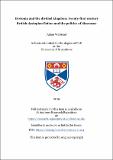Files in this item
Dystopia and the divided kingdom : twenty-first century British dystopian fiction and the politics of dissensus
Item metadata
| dc.contributor.advisor | Sellers, Susan | |
| dc.contributor.author | Welstead, Adam | |
| dc.coverage.spatial | 237 p. | en_US |
| dc.date.accessioned | 2019-02-20T16:23:44Z | |
| dc.date.available | 2019-02-20T16:23:44Z | |
| dc.date.issued | 2019-06-25 | |
| dc.identifier.uri | https://hdl.handle.net/10023/17104 | |
| dc.description.abstract | This doctoral thesis examines the ways in which contemporary writers have adopted the critical dystopian mode in order to radically deconstruct the socio-political conditions that preclude equality, inclusion and collective political appearance in twenty-first century Britain. The thesis performs theoretically-informed close readings of contemporary novels from authors J.G. Ballard, Maggie Gee, Sarah Hall and Rupert Thomson in its analysis, and argues that the speculative visions of Kingdom Come (2006), The Flood (2004), The Carhullan Army (2007) and Divided Kingdom (2005) are engaged with a wave of contemporary dystopian writing in which the destructive and divisive forms of consensus that are to be found within Britain’s contemporary socio-political moment are identified and challenged. The thesis proposes that, in their politically-engaged extrapolations, contemporary British writers are engaged with specifically dystopian expressions of dissensus. Reflecting key theoretical and political nuances found in Jacques Rancière’s concept of ‘dissensus’, I argue that the novels illustrate dissensual interventions within the imagined political space of British societies in which inequalities, oppressions and exclusions are endemic – often proceeding to present modest, ‘minor’ utopian arguments for more equal, heterogeneous and democratic possibilities in the process. Contributing new, theoretically-inflected analysis of key speculative fictions from twenty-first century British writers, and locating their critiques within the literary, socio-political and theoretical contexts they are meaningfully engaged with, the thesis ultimately argues that in interrogating and reimagining the socio-political spaces of twenty-first century Britain, contemporary writers of dystopian fiction demonstrate literature working in its most dissensual, political and transformative mode. | en_US |
| dc.language.iso | en | en_US |
| dc.publisher | University of St Andrews | |
| dc.subject | Dystopia | en_US |
| dc.subject | Dystopian fiction | en_US |
| dc.subject | Contemporary fiction | en_US |
| dc.subject | Rancière | en_US |
| dc.subject | Utopia | en_US |
| dc.subject | Dissensus | en_US |
| dc.subject | Speculative fiction | en_US |
| dc.subject.lcc | PR830.D96W4 | |
| dc.subject.lcsh | English fiction--Great Britain--21st century--History and criticism | en |
| dc.subject.lcsh | Dystopias in literature | en |
| dc.title | Dystopia and the divided kingdom : twenty-first century British dystopian fiction and the politics of dissensus | en_US |
| dc.type | Thesis | en_US |
| dc.contributor.sponsor | University of St Andrews. 600th Anniversary Scholarship | en_US |
| dc.type.qualificationlevel | Doctoral | en_US |
| dc.type.qualificationname | PhD Doctor of Philosophy | en_US |
| dc.publisher.institution | The University of St Andrews | en_US |
| dc.rights.embargoreason | Embargo period has ended, thesis made available in accordance with University regulations | e |
| dc.identifier.doi | https://doi.org/10.17630/10023-17104 |
This item appears in the following Collection(s)
Items in the St Andrews Research Repository are protected by copyright, with all rights reserved, unless otherwise indicated.

